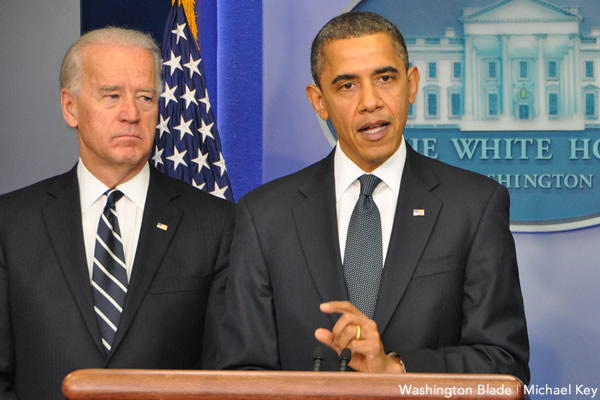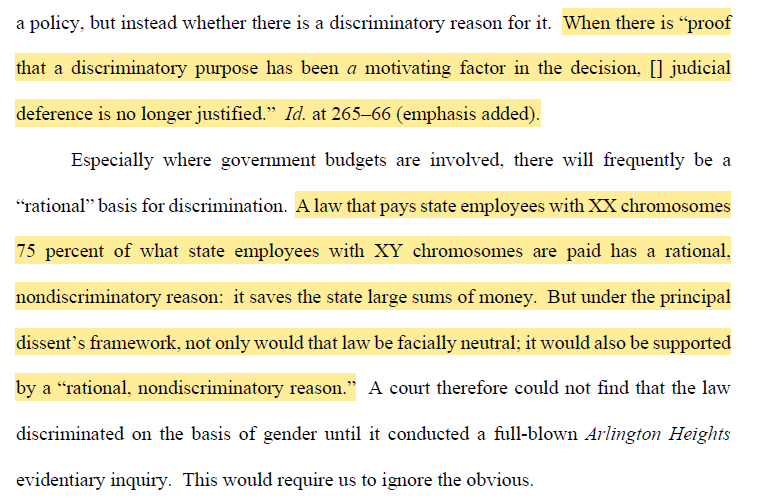News
Rep. Hartzler wants another shot at anti-trans military amendment
Missouri Republican wants inclusion of measure in spending package


Rep. Vicky Hartzler (R-Mo.) is seeking another shot at barring funds for transition-related case in the U.S. military
(Washington Blade file photo by Michael Key)
Rep. Vicky Hartzler (R-Mo.) is looking for another shot at her amendment that would have barred the Pentagon from paying for transition-related health care for transgender service members, according to Politico.
In the aftermath of the U.S. House narrowly rejecting the amendment as part of the fiscal year 2008 defense authorization bill, Hartzler is reportedly leading “a mix of GOP defense hawks and conservatives” to include the measure in a different spending bill that will soon arrive on the floor.
“Steps must be taken to address this misuse of our precious defense dollars,” Hartzler said in a statement to Politico. “This policy hurts our military’s readiness and will take over a billion dollars from the Department of Defense’s budget. This is still an important issue that needs to be addressed.”
As introduced by Hartzler the last time around, the amendment would prohibit the Pentagon from made expenditures in its health system for transition-related care, including hormone therapy and gender reassignment surgery, for both service members and their dependents.
According Politico, supporters of the amendment are urging House Speaker Paul Ryan (R-Wis.) to use a procedural trick to include the amendment automatically as part of the spending bill. Failing that, they’re requesting another floor vote on the amendment as part of consideration for the base bill.
The House last week voted down the Hartler amendment by a 214-209. Twenty-four Republicans and all 190 Democrats present voted against the measure.
According to Politico, most Republicans expected the Hartzler amendment to pass overwhelmingly and were surprised when it failed. (Ryan told the Washington Blade during his news conference he supported the measure and predicted it would pass.) The morning after the defeat of the amendment, Republicans spent a good chuck of a closed-door GOP conference meeting harping about what happened, the Politico reported.
Conceivably, the measure could pass the second time around. Six Republican last time didn’t vote or were absent (including House Majority Whip Steve Scalise, who’s recovering from a gun shot wound). Rep Brian Mast (R-Fla.), who voted against the provision, has since said his vote was in error and he meant to vote for it.
Caroline Boothe, a House Rules Committee spokesperson, said Hartzler hasn’t yet submitted an amendment for potential consideration as part of the defense appropriations bill.
“We have yet to receive the Hartzler amendment again for the bills next week,” Boothe said. “But when we do, the Committee will consider it like we do any other amendments.”
According to Politico, senior Republican sources predicted leadership would deny the request to add Hartzler amendment’s to a House rule because it would circumvent regular order. Whether a separate floor amendment on the proposal would be allowed is unclear.
Openly transgender service has been the rule for the U.S. military for about a year in the aftermath of an Obama-era policy change that lifted the regulatory ban on their service. Transgender people can come out in the military without fear of discharge, but openly transgender people still can’t enlist. Defense Secretary James Mattis pushed back the target date for that change until Jan. 1 pending a review of transgender service.
Media outlets reported when Hartzler offered her around last week, Mattis privately contacted her to urge her to withdraw the measure. White House Director of Legislative Affairs Marc Short denied the White House whipped a “no” vote on the measure, although he said there was a question about whether it should be include in the defense authorization bill.
Aaron Belkin, director of the San Francisco-based Palm Center, blasted Hartzler in a statement for not giving up on her amendment, accusing of inventing false data to bolster her case against transgender military service.
“Thousands of transgender troops have been serving for an entire year, and they have been widely praised by Commanders,” Belkin said, “and 18 foreign militaries allow transgender personnel to serve. Transgender military service works, and pretending that it does not requires inventing data. This is the same, discredited strategy that opponents used to prop up the failed ‘don’t ask, don’t tell’ policy the first time around.”
Read more at Politico.
Federal Government
4th Circuit rules gender identity is a protected characteristic
Ruling a response to N.C., W.Va. legal challenges
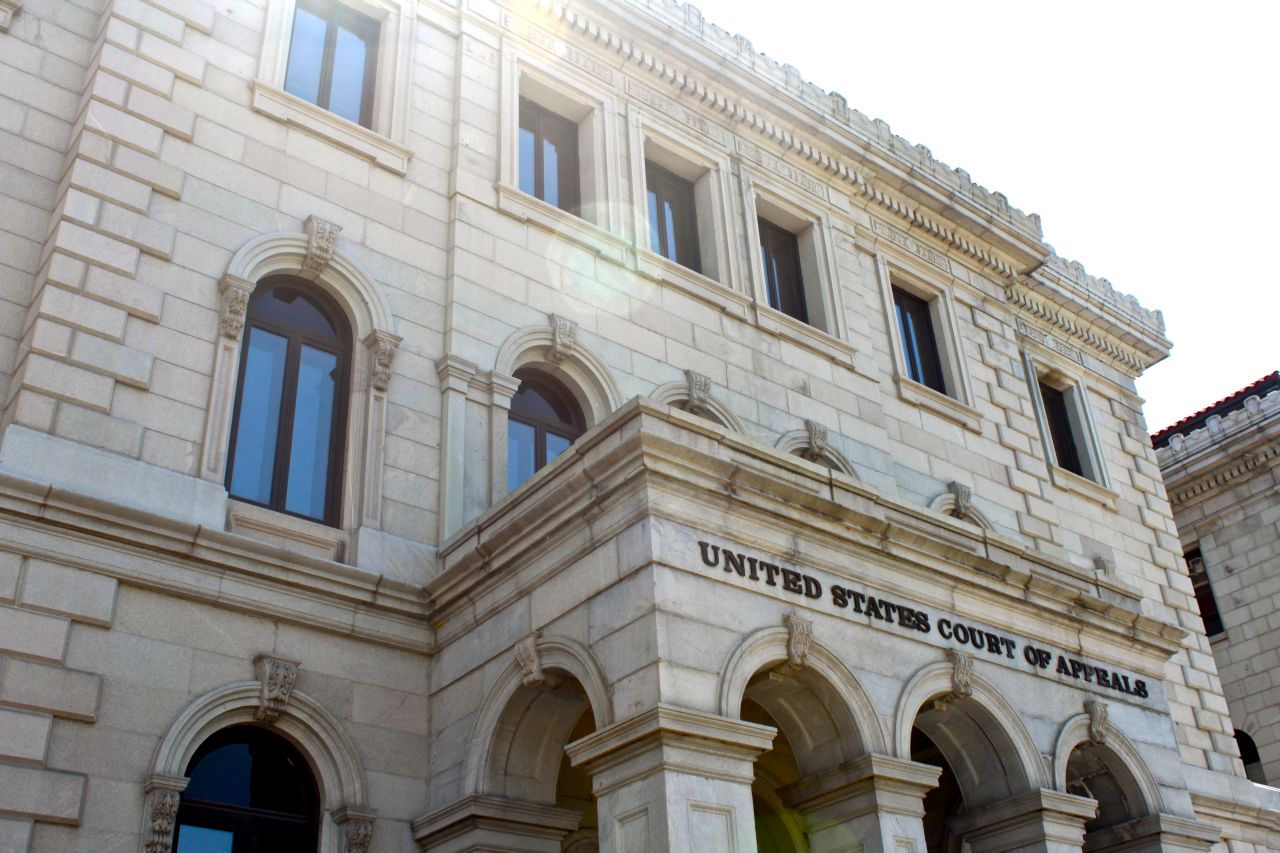
BY ERIN REED | The 4th U.S. Circuit Court of Appeals ruled Monday that transgender people are a protected class and that Medicaid bans on trans care are unconstitutional.
Furthermore, the court ruled that discriminating based on a diagnosis of gender dysphoria is discrimination based on gender identity and sex. The ruling is in response to lower court challenges against state laws and policies in North Carolina and West Virginia that prevent trans people on state plans or Medicaid from obtaining coverage for gender-affirming care; those lower courts found such exclusions unconstitutional.
In issuing the final ruling, the 4th Circuit declared that trans exclusions were “obviously discriminatory” and were “in violation of the equal protection clause” of the Constitution, upholding lower court rulings that barred the discriminatory exclusions.
The 4th Circuit ruling focused on two cases in states within its jurisdiction: North Carolina and West Virginia. In North Carolina, trans state employees who rely on the State Health Plan were unable to use it to obtain gender-affirming care for gender dysphoria diagnoses.
In West Virginia, a similar exclusion applied to those on the state’s Medicaid plan for surgeries related to a diagnosis of gender dysphoria. Both exclusions were overturned by lower courts, and both states appealed to the 4th Circuit.
Attorneys for the states had argued that the policies were not discriminatory because the exclusions for gender affirming care “apply to everyone, not just transgender people.” The majority of the court, however, struck down such a claim, pointing to several other cases where such arguments break down, such as same-sex marriage bans “applying to straight, gay, lesbian, and bisexual people equally,” even though straight people would be entirely unaffected by such bans.
Other cases cited included literacy tests, a tax on wearing kippot for Jewish people, and interracial marriage in Loving v. Virginia.
See this portion of the court analysis here:
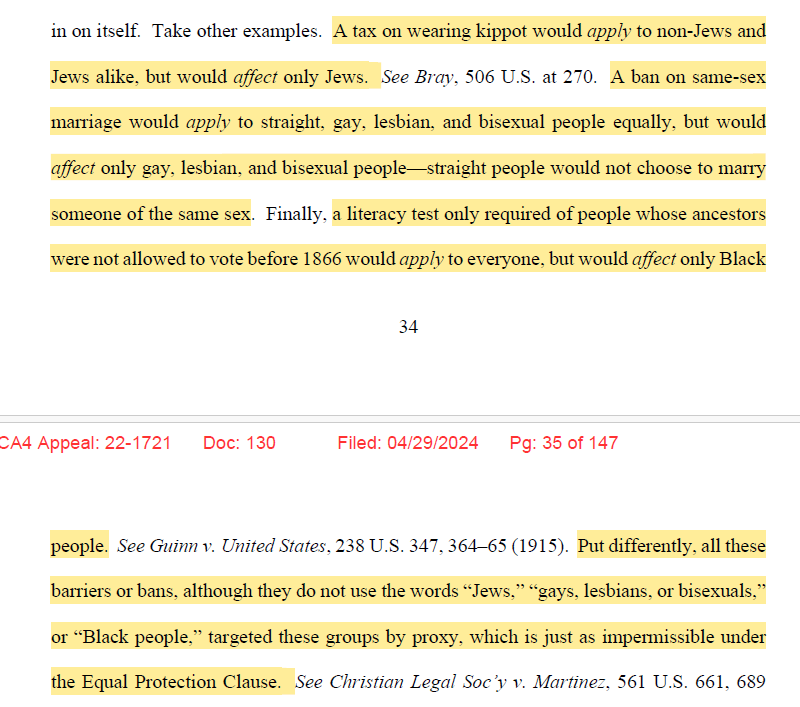
Of particular note in the majority opinion was a section on Geduldig v. Aiello that seemed laser-targeted toward an eventual U.S. Supreme Court decision on discriminatory policies targeting trans people. Geduldig v. Aiello, a 1974 ruling, determined that pregnancy discrimination is not inherently sex discrimination because it does not “classify on sex,” but rather, on pregnancy status.
Using similar arguments, the states claimed that gender affirming care exclusions did not classify or discriminate based on trans status or sex, but rather, on a diagnosis of gender dysphoria and treatments to alleviate that dysphoria.
The majority was unconvinced, ruling, “gender dysphoria is so intimately related to transgender status as to be virtually indistinguishable from it. The excluded treatments aim at addressing incongruity between sex assigned at birth and gender identity, the very heart of transgender status.” In doing so, the majority cited several cases, many from after Geduldig was decided.
Notably, Geduldig was cited in both the 6th and 11th Circuit decisions upholding gender affirming care bans in a handful of states.
The court also pointed to the potentially ridiculous conclusions that strict readings of what counts as proxy discrimination could lead to, such as if legislators attempted to use “XX chromosomes” and “XY chromosomes” to get around sex discrimination policies:
Importantly, the court also rebutted recent arguments that Bostock applies only to “limited Title VII claims involving employers who fired” LGBTQ employees, and not to Title IX, which the Affordable Care Act’s anti-discrimination mandate references. The majority stated that this is not the case, and that there is “nothing in Bostock to suggest the holding was that narrow.”
Ultimately, the court ruled that the exclusions on trans care violate the Equal Protection Clause of the Constitution. The court also ruled that the West Virginia Medicaid Program violates the Medicaid Act and the anti-discrimination provisions of the Affordable Care Act.
Additionally, the court upheld the dismissal of anti-trans expert testimony for lacking relevant expertise. West Virginia and North Carolina must end trans care exclusions in line with earlier district court decisions.
The decision will likely have nationwide impacts on court cases in other districts. The case had become a major battleground for trans rights, with dozens of states filing amicus briefs in favor or against the protection of the equal process rights of trans people. Twenty-one Republican states filed an amicus brief in favor of denying trans people anti-discrimination protections in healthcare, and 17 Democratic states joined an amicus brief in support of the healthcare rights of trans individuals.
Many Republican states are defending anti-trans laws that discriminate against trans people by banning or limiting gender-affirming care. These laws could come under threat if the legal rationale used in this decision is adopted by other circuits. In the 4th Circuit’s jurisdiction, West Virginia and North Carolina already have gender-affirming care bans for trans youth in place, and South Carolina may consider a similar bill this week.
The decision could potentially be used as precedent to challenge all of those laws in the near future and to deter South Carolina’s bill from passing into law.
The decision is the latest in a web of legal battles concerning trans people. Earlier this month, the 4th Circuit also reversed a sports ban in West Virginia, ruling that Title IX protects trans student athletes. However, the Supreme Court recently narrowed a victory for trans healthcare from the 9th U.S. Circuit Court of Appeals and allowed Idaho to continue enforcing its ban on gender-affirming care for everyone except the two plaintiffs in the case.
Importantly, that decision was not about the constitutionality of gender-affirming care, but the limits of temporary injunctions in the early stages of a constitutional challenge to discriminatory state laws. It is likely that the Supreme Court will ultimately hear cases on this topic in the near future.
Celebrating the victory, Lambda Legal Counsel and Health Care Strategist Omar Gonzalez-Pagan said in a posted statement, “The court’s decision sends a clear message that gender-affirming care is critical medical care for transgender people and that denying it is harmful and unlawful … We hope this decision makes it clear to policy makers across the country that health care decisions belong to patients, their families, and their doctors, not to politicians.”
****************************************************************************

Erin Reed is a transgender woman (she/her pronouns) and researcher who tracks anti-LGBTQ+ legislation around the world and helps people become better advocates for their queer family, friends, colleagues, and community. Reed also is a social media consultant and public speaker.
******************************************************************************************
The preceding article was first published at Erin In The Morning and is republished with permission.
World
Out in the World: LGBTQ news from Europe and Asia
Iraqi MPs passed bill that criminalizes same-sex relationships, transgender people

IRAQ
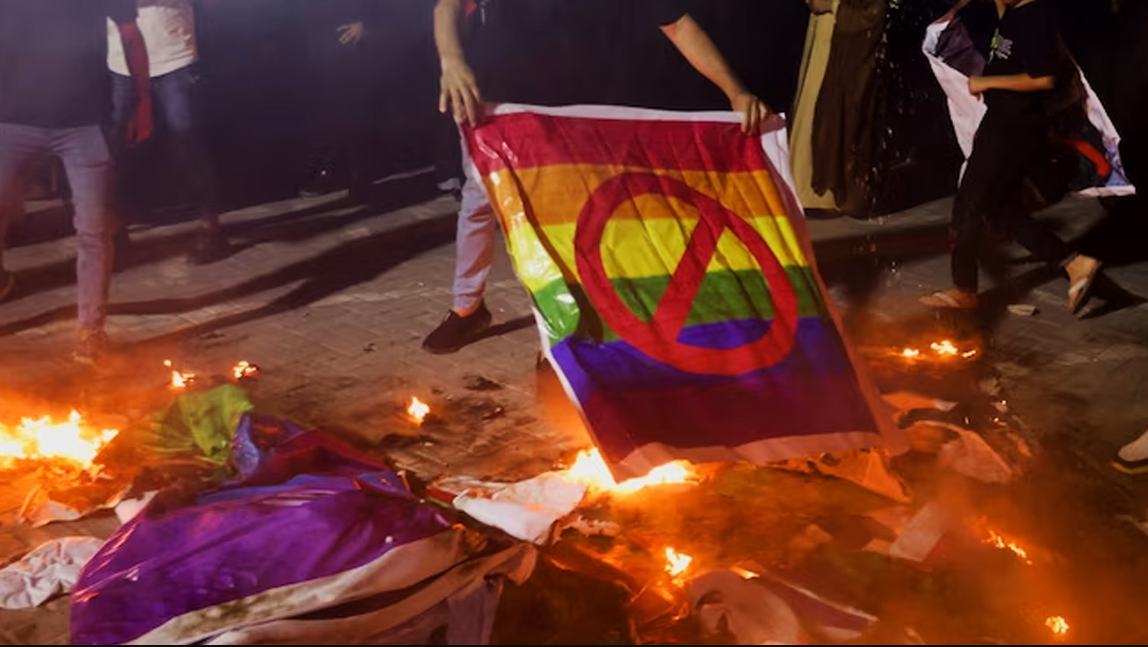
A law passed by the Iraqi parliament Saturday criminalizes same-sex relationships with a maximum 15-year prison sentence and also penalizes transgender Iraqis who face potential prison sentences ranging between one and three years under the new law.
MP Nouri al-Maliki told the AFP news agency that passage of the measure was delayed until after Prime Minister Mohamed Shia al-Sudani’s visit to Washington earlier this month. A second MP, Amir al-Maamouri, told Shafaq News that the new law was “a significant step in combating sexual deviancy given the infiltration of unique cases contradicting Islamic and societal values.”
In a statement released by State Department spokesperson Matthew Miller noted:
“The United States is deeply concerned by the Iraqi Council of Representatives’ passage of an amendment to existing legislation, officially called the Anti-Prostitution and Homosexuality Law, which threatens constitutionally protected human rights and fundamental freedoms. The law bans same-sex relations with steep fines and imprisonment and punishes those who ‘promote homosexuality.’ Limiting the rights of certain individuals in a society undermines the rights of all.
This amendment threatens those most at risk in Iraqi society. It can be used to hamper free-speech and expression and inhibit the operations of NGOs across Iraq. The legislation also weakens Iraq’s ability to diversify its economy and attract foreign investment. International business coalitions have already indicated that such discrimination in Iraq will harm business and economic growth in the country.
Respect for human rights and political and economic inclusion is essential for Iraq’s security, stability, and prosperity. This legislation is inconsistent with these values and undermines the government’s political and economic reform efforts.”
British Secretary of State David Cameron in a statement posted to X called the law “dangerous and worrying.” He added “no one should be targeted for who they are. We encourage the government of Iraq to uphold human rights and freedoms of all people without distinction.”
GERMANY

According to German media outlet Preussische Allgemeine Zeitung, a group of professional footballers from the German Football League (Deutsche Fußball Liga) will be announcing that they are gay on the International Day Against Homophobia, Biphobia and Transphobia on May 17.
PinkNewsUK reported the German outlet has quoted Marcus Urban as a source. Urban is a former footballer in Germany who came out after retiring. He was the second player worldwide to come out, only after British player Justin Fashanu in 1990. Fashanu was the only prominent player in pro English football to come out, until Jake Daniels in 2022.
Urban told Editorial Network Germany (Redaktions Netzwerk Deutschland) the move is part of an initiative in Germany in an attempt to encourage closet LGBTQ players and others working in football to come out. All clubs involved are said to have been made aware of the imminent announcement.
Urban is a co-founder of Diversero, a global community who celebrate and live diversity that he said contact with the players. Speaking about the closeted players he noted: “There is controversy there. Do I still want to wait until the world of football becomes the way I want it to be?”
COUNCIL OF EUROPE
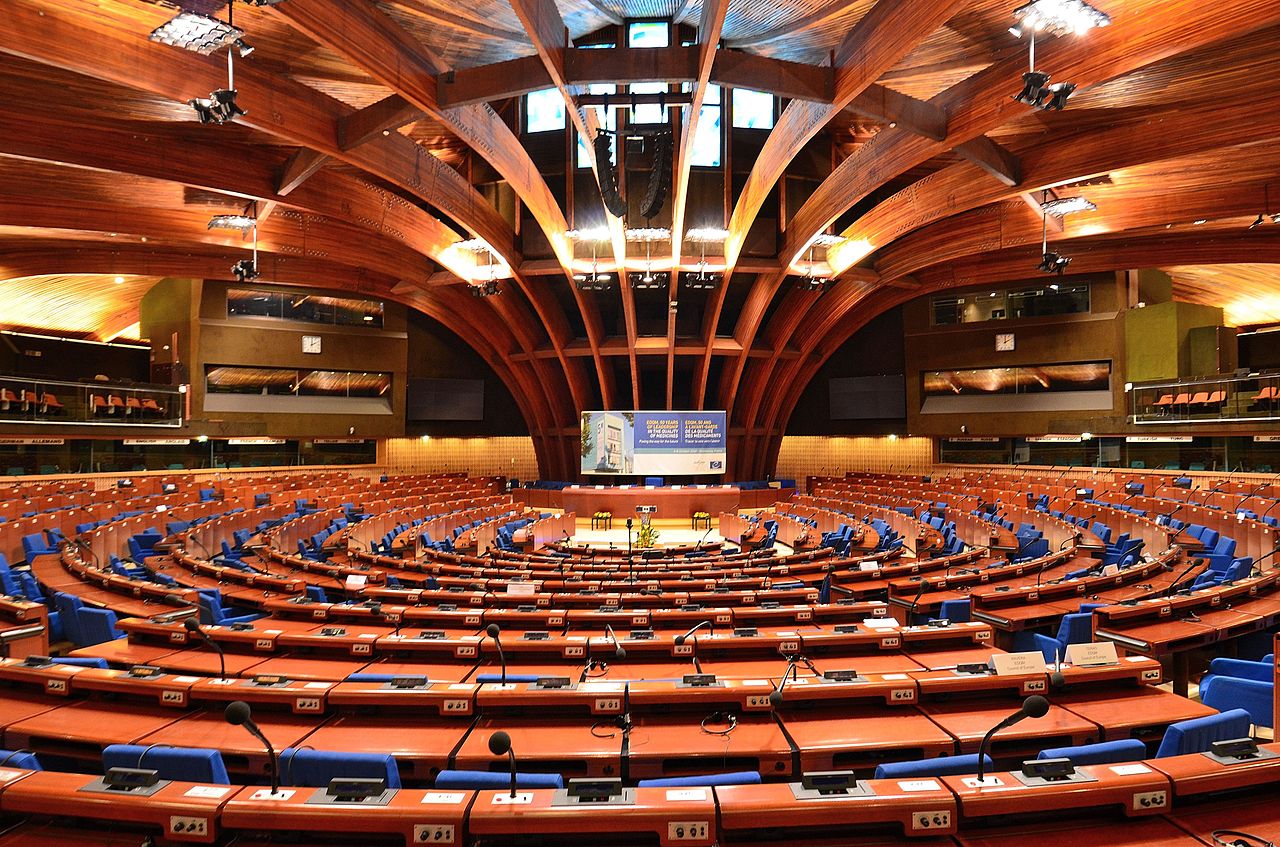
The Council of Europe’s Committee for the Prevention of Torture has issued a set of standards and recommendations to European prisons aimed at ensuring that trans prisoners, a highly vulnerable segment of the prison population, are treated with respect and protected from the risks of ill-treatment.
In its annual report for 2023, the CPT notes that it is increasingly meeting trans persons held in prisons during its visits to states to monitor the conditions of detention of persons deprived of liberty. The CPT aims to provide guidance to governments and prison administrations, considering that European countries are currently implementing divergent policies and that there is a current debate as to how to treat transgender persons in prison.
CPT President Alan Mitchell said: “Prisons are a microcosm of society, often with amplified issues given the smaller confined settings. Transgender persons held in detention can be in a situation of vulnerability and a heightened risk of intimidation and abuse. It is concerning that a few states still deny the existence of transgender persons and make no specific provision for their treatment in prison, which may expose them to ill-treatment. Governments should put in place safeguards to protect transgender persons in detention and ensure that they are treated with dignity and care.
“The report identifies as a challenge the widely divergent criteria of placement of transgender persons throughout Europe depending on individual states’ policies. Some are based on self-identification and declaration, others on legal recognition, and a few on gender-affirming surgery. Few states have specific policies and legislation to guide prison authorities on placement of transgender persons, often done on a case-by-case basis subject to an individual risk assessment.
In line with the European Court of Human Rights case law, the CPT highlights that national legislation should provide for the recognition of persons of a gender other than that assigned by birth and not establish any pre-condition to legal gender recognition such as gender-affirming surgery. Consequently, when a person self-identifies as transgender in the prison admission procedure, this should be sufficient for the prison administration to treat the person as such.
The CPT considers that transgender persons should be accommodated in the prison section corresponding to the gender with which they identify. Although there have been a few unfortunate cases of the placement in women’s prison sections of transgender persons accused or convicted of sexual offences against women, the committee highlights that, as for any other prisoners, they should only be placed elsewhere for exceptional security or other reasons after an individual risk assessment. In addition, transgender prisoners should be consulted about their placement preference during the entry procedure and be given the option to keep their gender identity confidential.
During its visits to several states, the CPT met transgender women prisoners held in male sections who stated they did not feel safe, and some alleged having been sexually abused and assaulted by other prisoners or verbally abused by staff. In some countries, the CPT also met transgender women who reported that they were often not allowed to shower at different times as male prisoners, were humiliated by being referred to by their male names or prohibited from wearing women´s clothes.
In the CPT’s view, transgender prisoners should be allowed to dress in the clothes associated with their self-identified gender and be addressed by their chosen names by prison staff. Prison administrations should also address them by their preferred names, titles and pronouns in verbal and written communication, irrespective of official documents. Further, national and prison authorities should ensure that all prison staff is trained to understand and address the specific needs of transgender persons and the risks they are exposed to in the prison environment.
The committee urges national authorities to address the risks of discrimination of transgender persons in prison and implement policies to prevent and combat ill-treatment by prison staff and inter-prison violence and intimidation targeting them. It also provides guidance to ensure that body searches of transgender persons are not perceived as degrading by the persons concerned.”
UNITED KINGDOM
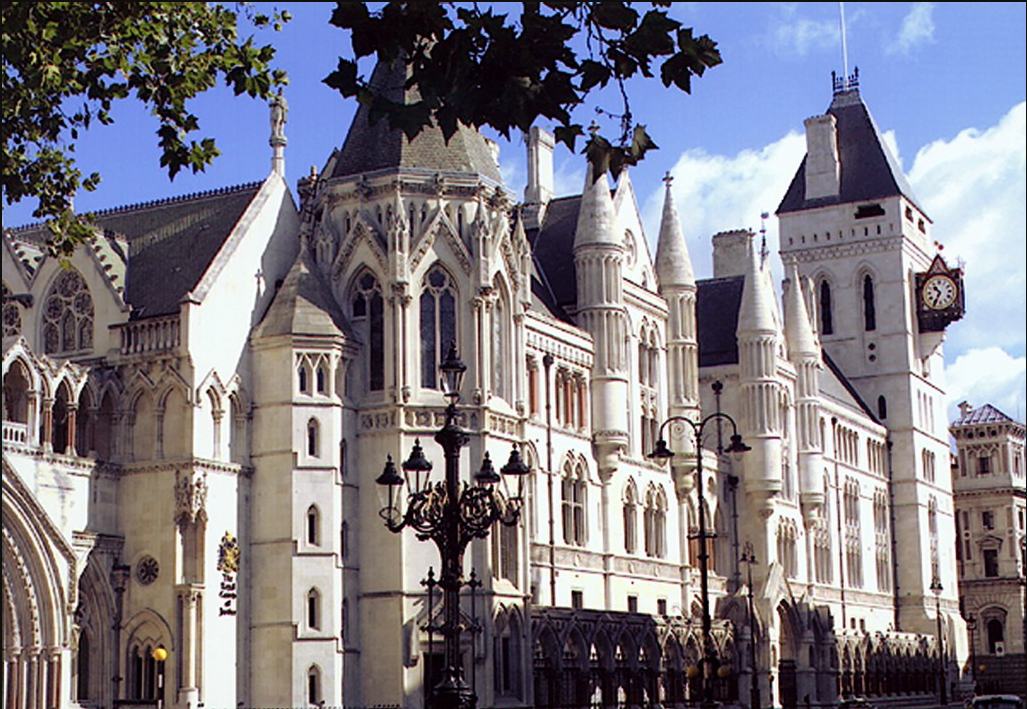
Royal Courts of Justice (Photo courtesy of the British government)
The Austen Hays Limited law firm this week launched a class action lawsuit in the High Court of Justice in London against West Hollywood, Calif.,- based Grindr, alleging that the world’s largest LGBTQ casual encounters app had violated British data protection laws.
Reuters reported that the suit claims British users’ highly sensitive information, including HIV status and the date of their latest HIV test, were provided to third parties for commercial purposes.
In a statement released to the media a spokesperson for Grindr said: “We are committed to protecting our users’ data and complying with all applicable data privacy regulations, including in the UK. We are proud of our global privacy programme and take privacy extremely seriously. We intend to respond vigorously to this claim, which appears to be based on a mischaracterisation of practices from more than four years ago, prior to early 2020.”
The Austen Hays Limited law firm’s managing director Chaya Hanoomanjee responded saying:
“Our clients have experienced significant distress over their highly sensitive and private information being shared without their consent. Many have suffered feelings of fear, embarrassment, and anxiety as a result,” Hanoomanjee said.
“Grindr owes it to the LGBTQ+ community it serves to compensate those whose data has been compromised and have suffered distress as a result, and to ensure all its users are safe while using the app, wherever they are, without fear that their data might be shared with third parties,” she added.
So far 670 people have signed up to the claim, and the firm said “thousands” more people had expressed interest in joining.
The Irish Examiner reported on Monday, April 22 that the claim against Grindr will be focused on the periods before April 3, 2018, and between May 25, 2018, and April 7, 2020, meaning newer users are unlikely to be able to join. Grindr changed its consent mechanisms in April 2020.
Grindr, based in Los Angeles, announced it would stop sharing users’ HIV status with third-party companies in April 2018 after a report by Norwegian researchers revealed data sharing with two companies.
HONG KONG
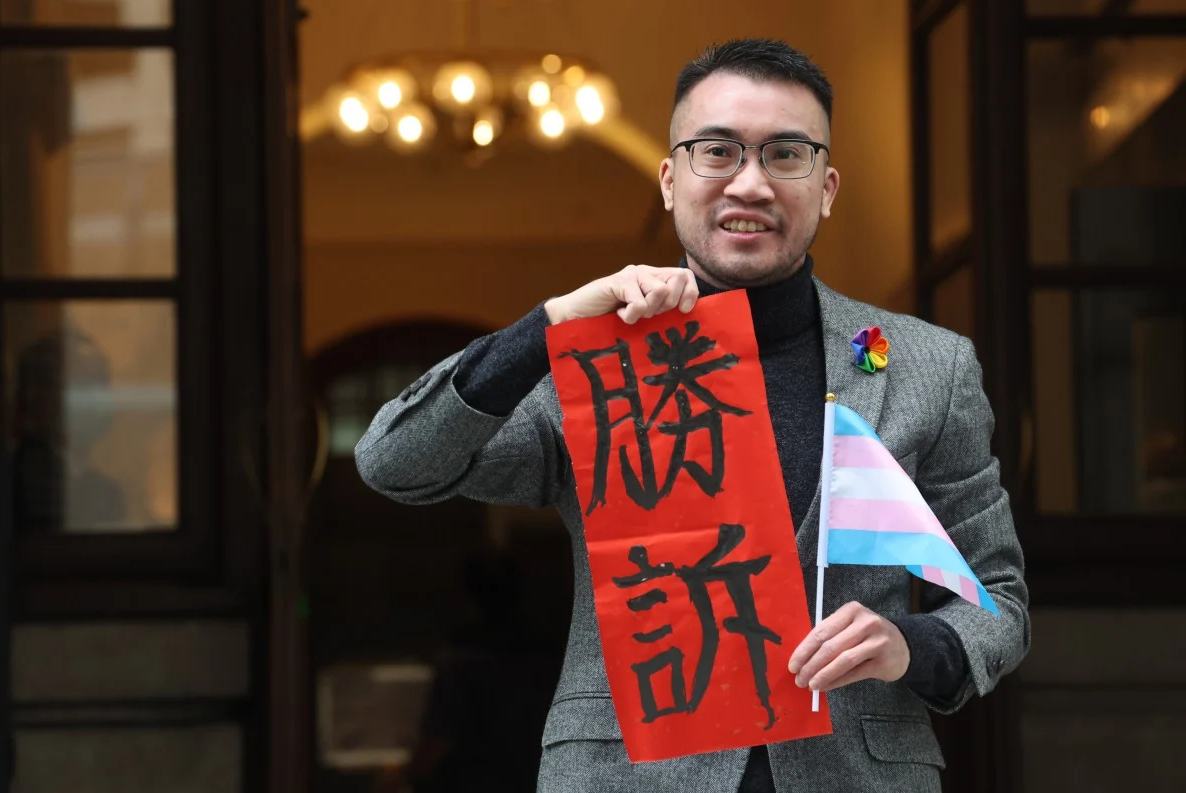
A 33-year-old trans man who has been battling authorities to change his gender from female to male on his Hong Kong ID card since he first launched legal action in 2017, and winning a verdict from the Court of Final Appeal in February 2023, has finally been able to get his new ID card this week.
In an interview with Hong Kong-based South China Morning Post journalist Lo Hoi-ying, Tse told her: “I thought to myself, I have won the lawsuit over a year ago, why do I still have to go through all of this?”
Tse, the chairman of the NGO Transgender Equality Hong Kong, also filed a separate lawsuit against the government in March for what he said was a discriminatory delay in issuing him his new ID card.
He said he would seek monetary compensation for the distress caused by the delay, which could not be forgotten even after changing his card. “Potentially in the future, if there are similar cases for the LGBTQ community, the government should not delay policy updates like this,” he said.
While Tse said that his new ID could make life easier for him and solve some surface issues, he conceded it was only a small step in the fight for trans rights, the South China Morning Post reported.
“The updated policy is not fully trans-inclusive, as measures such as submitting blood test reports for randomized checks still violate our privacy,” he said.
“There are still many hurdles for us, such as marriage. These are all issues we have to confront, which cannot be solved merely by an ID change.”
Additional reporting by Agence France-Presse, Shafaq News, Redaktions Netzwerk Deutschland, Office of Public Affairs for the Council of Europe, BBC News, PinkNewsUK, Irish Examiner, and the South China Morning Post.
District of Columbia
Weekend brings two shootings in U Street, Dupont Circle areas
Man dies after incident at Desperados

A man was shot to death shortly after 1 a.m. on Saturday, April 27, inside the Desperados Burgers & Bar at 1342 U St., N.W., which is located on the same block a short distance away from the LGBTQ nightclub Bunker D.C. and around the corner less than a block away from the recently opened LGBTQ bar Crush on 14th Street, N.W.
The incident prompted Bunker to post on its Facebook page a message saying its security team quickly ushered patrons standing outside to enter the club and as a precautionary measure prevented patrons from leaving until it was deemed safe to do so.
A D.C. police statement identifies the shooting victim as Kenneth Goins, 43, of Salisbury, Md. The statement says officers on patrol in the 1300 block of U Street, N.W. heard gunshots at about 1:12 a.m. and immediately arrived at Desperados to investigate the incident.
“Officers located a man inside with multiple gunshot wounds,” the statement says. “Despite all life saving efforts, the victim was pronounced dead on the scene,” it says. Neither the statement nor a police incident report pertaining to the shooting provides a description of the person who committed the shooting nor discloses whether any of the customers inside the restaurant and bar witnessed the shooting.
The statement says the police Homicide Branch is investigating the shooting and urges anyone with knowledge of the incident to call police at 202-272-9099. Like all homicide cases, it says the D.C. Metropolitan Police Department offers a reward of up to $25,000 to anyone who provides information that leads to the arrest and conviction of the person or persons responsible for a homicide committed in the District.
“There was a shooting incident on U ST. N.W., just 4 doors down from BUNKER,” the Bunker Facebook post says. “Our security team promptly responded, ensuring the safety of everyone by ushering them inside for cover,” it says. “Currently, the courageous police officers are outside, handling the situation and working diligently to maintain a secure environment for our guests,” the message continues.
“As a responsible establishment, we strongly prioritize your safety, and as a precautionary measure, we will not permit anyone to exit the building until we deem it safe to do so,” the posting says. “Rest assured, we, as the owners, take this matter very seriously, and your safety remains our highest priority.”
The U Street shooting at Desperados Burgers & Bar took place a little over two hours after six people were shot and wounded outside the Decades nightclub at 1219 Connecticut Ave., N.W. near Dupont Circle and near several gay bars on P Street and 17th Street in the Dupont Circle area. Police said none of those who were shot suffered life-threatening injuries
A separate police statement says with the help of several witnesses, police identified and arrested Rennwel Mantock, 29, of Hyattsville, Md., in connection with the shooting on charges of Assault with Intent to Kill, Possession of Unregistered Ammunition, and Possession of an Unregistered Firearm. The statement says a gun belonging to Mantock was recovered on the scene. Court records show a judge has ordered him to be held without bond until a May 7 preliminary hearing.
“The detectives’ investigation determined Mantock opened fire after employees removed him from a nightclub following a dispute,” according to the statement.
A police arrest affidavit filed in D.C. Superior Court says Mantock told police at the time he was apprehended on the scene that he was dancing with a woman at the club when a security guard ordered him to leave and then “grabbed him by the neck and punched him in the face right before dragging him down the steps.” The Decades club states on its website that it has several floors with multiple bars.
According to the arrest affidavit, Mantock told police that one of the security officials punched him in the face again and threw him to the ground after dragging him out the door. It says Mantock “stated that he then pulled out his gun and started shooting” because “he was very upset about the security punching him in the face,” adding that he “began firing at the Decades’ security.”
The affidavit says five of the six people shot were Decades employees.
Gay former Dupont Circle Advisory Neighborhood Commissioner Mike Silverstein, who lives near where the shooting took place, said Decades is not known as a place that LGBTQ people patronize but said the surrounding neighborhood is home to many LGBTQ residents and draws many LGBTQ visitors.
-

 District of Columbia5 days ago
District of Columbia5 days agoCatching up with the asexuals and aromantics of D.C.
-

 South America4 days ago
South America4 days agoArgentina government dismisses transgender public sector employees
-

 Mexico3 days ago
Mexico3 days agoMexican Senate approves bill to ban conversion therapy
-

 Advice3 days ago
Advice3 days agoShould I divorce my husband for the hot new guy in our building?



